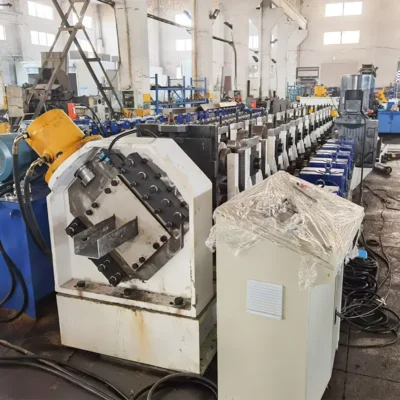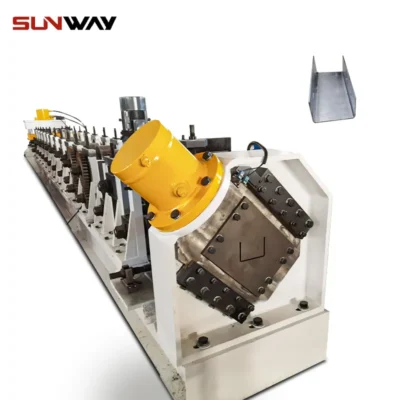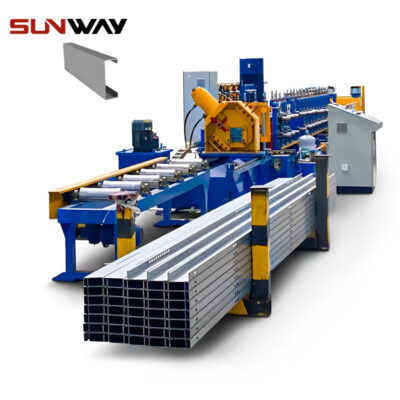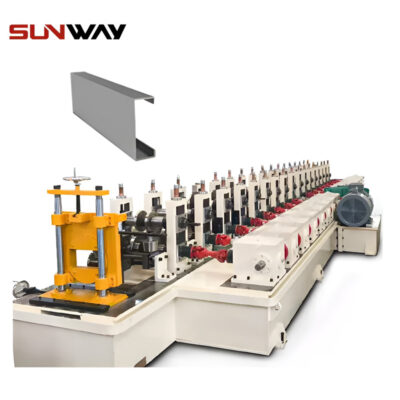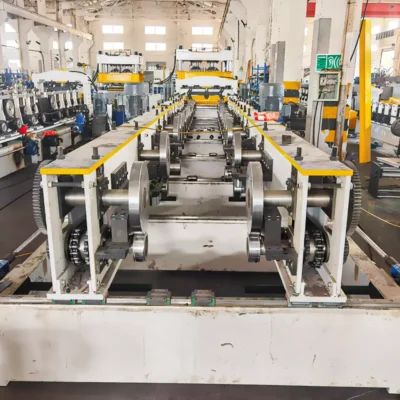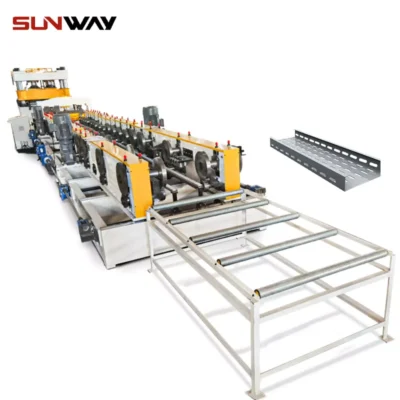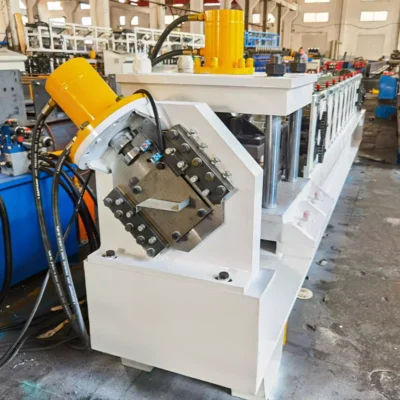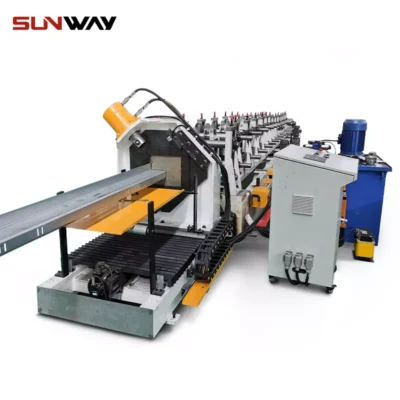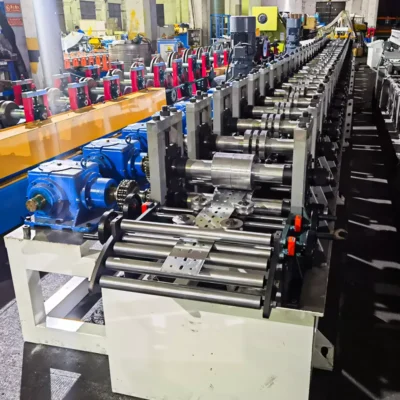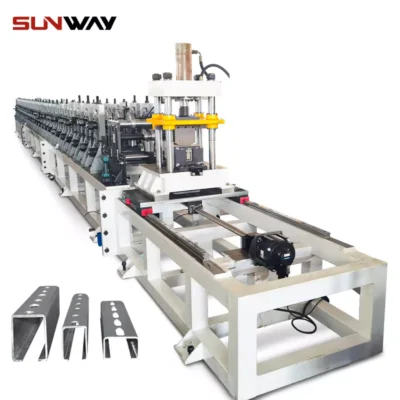The construction industry is evolving rapidly, with a growing demand for durable, lightweight, and cost-effective roofing systems. At the forefront of this evolution are Roof Truss Roll Forming Machines, which are revolutionizing the way roof trusses are manufactured. These machines are designed to produce high-precision, load-bearing truss profiles that form the backbone of residential, commercial, and industrial roofing structures. Whether it’s for high-rise buildings or prefabricated homes, roof trusses built using roll-forming technology ensure structural integrity, faster construction, and long-term durability.
In this detailed guide, we’ll explore everything about Roof Truss Roll Forming Machines, including their applications, features, pricing, and the latest innovations transforming the roofing industry in 2025. We’ll also showcase why Wuxi Sunway Machinery is a trusted leader in delivering high-quality roll-forming solutions globally.
What is a Roof Truss Roll Forming Machine?
A Roof Truss Roll Forming Machine is a specialized industrial machine used to produce metal roof trusses by shaping metal sheets or coils into precise truss profiles. The roll-forming process involves passing the raw material through a series of rollers that incrementally bend and shape it into the desired truss structure. These machines are designed to produce lightweight yet strong profiles that serve as the skeletal framework for roofs in various construction projects.
Roof trusses manufactured by these machines are known for their load-bearing capacity, corrosion resistance, and compatibility with modern construction techniques, making them a vital component in the construction industry.
Applications of Roof Truss Roll Forming Machines
Roof trusses are indispensable in construction, offering strength and stability to roofing systems. Below are the primary applications of Roof Truss Roll Forming Machines:
1. Residential Buildings
- Use Case: Roof trusses for single-family homes, townhouses, and apartment complexes.
- Why It Matters: Lightweight trusses reduce the overall load on the building structure while ensuring long-term durability.
2. Commercial Construction
- Use Case: Roofing systems for office buildings, shopping centers, and hotels.
- Why It’s Crucial: High-strength trusses provide the support needed for expansive roof designs in commercial spaces.
3. Industrial Facilities
- Use Case: Roof trusses for warehouses, factories, and workshops.
- Why It’s Important: Roll-formed trusses offer excellent load-bearing capabilities, essential for industrial roofing.
4. Prefabricated and Modular Homes
- Use Case: Trusses for prefabricated housing and modular construction projects.
- Why It’s Exciting: Roll-forming machines enable the mass production of trusses, speeding up construction timelines.
5. Agricultural Structures
- Use Case: Roof trusses for barns, silos, and greenhouses.
- Why It Matters: Corrosion-resistant trusses ensure durability in harsh agricultural environments.
6. Stadiums and Arenas
- Use Case: Trusses for large-span roofing systems in sports facilities and convention centers.
- Why It’s Relevant: Roll-formed trusses provide the strength needed to support expansive roofs without excessive weight.

Key Features of Wuxi Sunway Roof Truss Roll Forming Machines
Wuxi Sunway Machinery is a global leader in roll-forming technology, offering machines tailored to meet the diverse needs of roof truss manufacturers. Here are the standout features of their machines:
1. High-Precision Rollers
- What It Offers: Rollers designed for precision shaping of truss profiles with tight tolerances.
- Why It’s Revolutionary: Ensures consistency and uniformity in truss dimensions, critical for seamless installation.
2. Material Versatility
- Supported Materials:
- Galvanized steel
- Aluminum
- Stainless steel
- Pre-coated and powder-coated metals
- Why It Matters: Enables manufacturers to produce trusses suitable for different climatic and structural requirements.
3. Automated Punching and Cutting Systems
- What It Includes: Integrated systems for creating holes, slots, and custom edges.
- Why It’s Crucial: Reduces the need for additional processing steps, streamlining production.
4. High-Speed Production
- Performance: Machines can produce up to 25 meters of truss profiles per minute, depending on the design.
- Why It Matters: Meets the high-volume demands of residential, commercial, and industrial construction projects.
5. Modular Tooling Systems
- What It Enables: Quick transitions between different truss designs and sizes.
- Why It’s Important: Enhances flexibility for manufacturers catering to diverse market needs.
6. Energy-Efficient Design
- What It Offers: Energy-saving motors and optimized power consumption systems.
- Why It Matters: Reduces operational costs and aligns with sustainability goals in construction.
7. Fully Automated Operations
- Features:
- PLC-controlled systems with a user-friendly interface.
- Real-time monitoring for error detection.
- Automated stacking and packaging systems.
- Why It’s Revolutionary: Reduces labor requirements while ensuring consistent quality and high throughput.
8. Durability and Longevity
- What It Ensures: Machines are built with high-grade components for long-term reliability.
- Why It’s Important: Reduces maintenance costs and ensures uninterrupted production.
Production Workflow of a Roof Truss Roll Forming Machine
The production process for roof trusses is designed for efficiency and precision. Here’s an overview of the workflow:
1. Decoiling
- Raw metal coils are loaded onto the decoiler, which feeds the material into the machine.
2. Leveling
- The leveling system ensures the material is flat and free from defects before entering the roll-forming section.
3. Roll Forming
- The material passes through a series of rollers that gradually shape it into the desired truss profile.
4. Punching and Cutting
- Integrated systems create holes, slots, and custom edges, and cut the trusses to the required lengths.
5. Quality Inspection
- Each truss is inspected for dimensional accuracy and surface finish to meet quality standards.
6. Stacking and Packaging
- Finished trusses are automatically stacked and packaged for easy transportation and installation.
Pricing of Roof Truss Roll Forming Machines
The cost of a Roof Truss Roll Forming Machine varies based on its features, production capacity, and level of automation. Below is a general pricing guide for 2025:
| Machine Type | Capabilities | Price Range (USD) |
|---|---|---|
| Standard Machines | Basic truss production | $200,000–$350,000 |
| Advanced Machines | High-speed and multi-profile output | $350,000–$550,000 |
| Fully Customizable Machines | Multi-material compatibility and custom features | $550,000–$800,000 |
For detailed pricing and financing options, contact Wuxi Sunway Machinery.
Advantages of Using Roof Truss Roll Forming Machines
Investing in a Roof Truss Roll Forming Machine offers significant benefits for manufacturers:
1. Increased Efficiency
- High-speed production reduces lead times and boosts overall output.
2. Precision and Consistency
- Ensures uniform quality across all trusses, minimizing installation errors.
3. Material Flexibility
- Supports a wide range of materials, including lightweight and corrosion-resistant options.
4. Cost Savings
- Reduces material waste and labor costs, improving profitability.
5. Scalability
- Suitable for both small-scale manufacturers and large-scale production facilities.
FAQs About Roof Truss Roll Forming Machines
| Question | Answer |
|---|---|
| Can the machine produce multiple truss designs? | Yes, modular tooling systems allow for quick transitions between different designs. |
| What is the expected production speed? | Machines can produce up to 25 meters of truss profiles per minute, depending on the design. |
| Does Wuxi Sunway provide operator training? | Yes, comprehensive training for operators and technicians is included with every purchase. |
| Are custom profiles supported? | Absolutely! The machine supports the production of custom truss profiles tailored to specific needs. |
| What is the machine’s expected lifespan? | With proper maintenance, these machines can last 10–15 years or more. |
| Are financing options available? | Yes, flexible financing options are offered to qualified buyers. |
Technological Advancements in Roof Truss Roll Forming Machines
The capabilities of Roof Truss Roll Forming Machines have grown exponentially, thanks to ongoing technological innovations. Here’s a look at the cutting-edge features that are transforming these machines in 2025.
1. AI-Powered Quality Assurance
- What It Does: Artificial intelligence monitors the production process in real-time to ensure trusses meet strict quality standards.
- Benefits:
- Detects defects instantly, reducing waste.
- Ensures uniformity and precision in every truss produced.
- Optimizes machine performance for higher efficiency.
2. IoT-Enabled Connectivity
- How It Works: Internet of Things (IoT) sensors collect data on machine performance, material usage, and production output.
- Advantages:
- Enables remote monitoring and predictive maintenance.
- Provides actionable insights for process optimization.
- Integrates seamlessly into smart factory environments.
3. Advanced Cutting and Punching Systems
- The Innovation: High-precision cutting and punching systems allow for the creation of complex features, including slots, holes, and custom angles.
- Why It’s Revolutionary:
- Simplifies post-production assembly.
- Enhances the structural integrity and functionality of trusses.
- Supports the production of versatile designs tailored to specific applications.
4. Energy-Efficient Motors
- What It Offers: Modern machines are equipped with energy-saving motors that reduce electricity consumption.
- Why It’s Crucial:
- Aligns with global sustainability initiatives.
- Lowers operational costs for manufacturers.
- Supports the goal of net-zero carbon emissions in industrial processes.
5. Modular Tooling Systems
- What It Enables: Quick transitions between different truss designs and profiles.
- Why It’s Important:
- Reduces downtime during production changes.
- Enhances flexibility for manufacturers serving diverse market needs.
- Simplifies the production of custom profiles.
6. Real-Time Data Analytics
- How It Works: Machines analyze production data in real-time to identify inefficiencies and optimize operations.
- Benefits:
- Improves overall productivity.
- Reduces material waste and energy usage.
- Helps manufacturers make data-driven decisions.

Environmental Impact of Roof Truss Roll Forming Machines
Sustainability is no longer optional—it’s a necessity. Roof Truss Roll Forming Machines play a critical role in reducing the environmental impact of construction by promoting eco-friendly practices.
1. Material Efficiency
- How It Works: The roll-forming process shapes metal with minimal waste, maximizing the use of raw materials.
- Impact:
- Conserves valuable resources.
- Reduces scrap material sent to landfills.
- Lowers production costs for manufacturers.
2. Use of Recyclable Materials
- What It Supports: Machines process recyclable materials like galvanized steel and aluminum, which can be reused at the end of their lifecycle.
- Why It Matters:
- Promotes a circular economy in construction.
- Reduces environmental impact during the disposal stage.
- Meets green building certification requirements.
3. Energy-Efficient Operations
- The Innovation: Energy-efficient motors and optimized power systems reduce electricity consumption without compromising performance.
- Why It’s Crucial:
- Helps manufacturers lower their carbon footprint.
- Supports the transition to sustainable manufacturing practices.
- Reduces operational expenses in the long run.
4. Localized Production
- What It Enables: Machines allow manufacturers to produce trusses locally, reducing the need for long-distance transportation.
- Outcome:
- Cuts down on emissions associated with shipping.
- Enhances supply chain reliability.
- Promotes regional sustainability initiatives.
Market Trends Influencing Roof Truss Roll Forming Machines in 2025
The demand for Roof Truss Roll Forming Machines is being shaped by several trends in the global construction market. Here’s what’s driving their adoption:
1. Prefabricated Construction Boom
- The Trend: Prefabricated and modular construction methods are gaining popularity due to their speed and efficiency.
- Impact on Roll Forming: Machines are indispensable for producing high volumes of trusses needed for prefabricated projects.
- Why It’s Significant: Prefabrication reduces construction timelines and waste, aligning with industry sustainability goals.
2. Urbanization and Infrastructure Development
- The Numbers: Over 68% of the global population is expected to live in urban areas by 2050, fueling the need for housing and infrastructure.
- Impact on Roll Forming: High-speed machines meet the demand for roofing systems in large-scale construction projects.
- Why It Matters: Roll-forming technology ensures consistent quality and scalability for urban development.
3. Focus on Lightweight Construction Materials
- The Shift: Lightweight materials are being used to reduce the overall weight of structures, improving seismic resistance and load efficiency.
- Impact on Roll Forming: Machines are designed to produce lightweight trusses without compromising strength.
- Why It’s Relevant: Lightweight trusses are ideal for high-rise buildings and modular construction.
4. Demand for Green Building Solutions
- The Goal: Green building certifications like LEED and BREEAM emphasize the use of sustainable materials and processes.
- Impact on Roll Forming: Machines support the production of recyclable and energy-efficient trusses.
- Why It’s Exciting: Sustainable construction practices are becoming a key differentiator in the market.
5. Advancements in Smart Manufacturing
- The Opportunity: Industry 4.0 technologies, including IoT and AI, are transforming how machines operate.
- Impact on Roll Forming: Smart machines offer higher efficiency, lower costs, and better quality control.
- Why It’s Important: Manufacturers can stay competitive in a rapidly evolving market.
Additional FAQs About Roof Truss Roll Forming Machines
| Question | Answer |
|---|---|
| Can the machine produce custom designs? | Yes, modular tooling systems allow for the production of custom truss profiles. |
| What is the typical production speed? | Machines can produce up to 25 meters of truss profiles per minute, depending on the design. |
| Does Wuxi Sunway provide after-sales support? | Absolutely! Comprehensive support, including installation and troubleshooting, is provided. |
| Are financing options available? | Yes, flexible financing solutions are offered for qualified buyers. |
| What industries benefit from these machines? | Industries include residential, commercial, industrial, and prefabricated construction sectors. |
| What is the average machine lifespan? | With proper maintenance, these machines can last 10–15 years or more. |
Why Choose Wuxi Sunway Machinery for Roof Truss Roll Forming Machines?
Here’s why Wuxi Sunway Machinery is the global leader in roll-forming solutions:
- Decades of Expertise: A proven track record of delivering cutting-edge roll-forming machines for the construction industry.
- Global Reach: Trusted by manufacturers across Asia, Europe, the Americas, and beyond.
- Sustainability Leadership: Eco-friendly designs that reduce waste and energy consumption.
- Custom Solutions: Machines tailored to meet the specific needs of roof truss manufacturers.
- Comprehensive Support: From installation to training, Sunway ensures seamless operations and customer satisfaction.
- Cutting-Edge Technology: Features like IoT integration, AI-driven quality control, and energy-efficient systems.
Conclusion: Building a Sustainable Future with Roof Truss Roll Forming Machines
The Roof Truss Roll Forming Machine is more than just a manufacturing tool—it’s a gateway to innovation, efficiency, and sustainability in construction. Whether you’re building homes, industrial facilities, or modular prefabricated structures, these machines deliver the precision and scalability needed to succeed in 2025 and beyond.
If you’re ready to elevate your manufacturing capabilities, contact Wuxi Sunway Machinery today to explore their state-of-the-art roll-forming solutions. Together, we can shape the future of roofing—one truss at a time!

